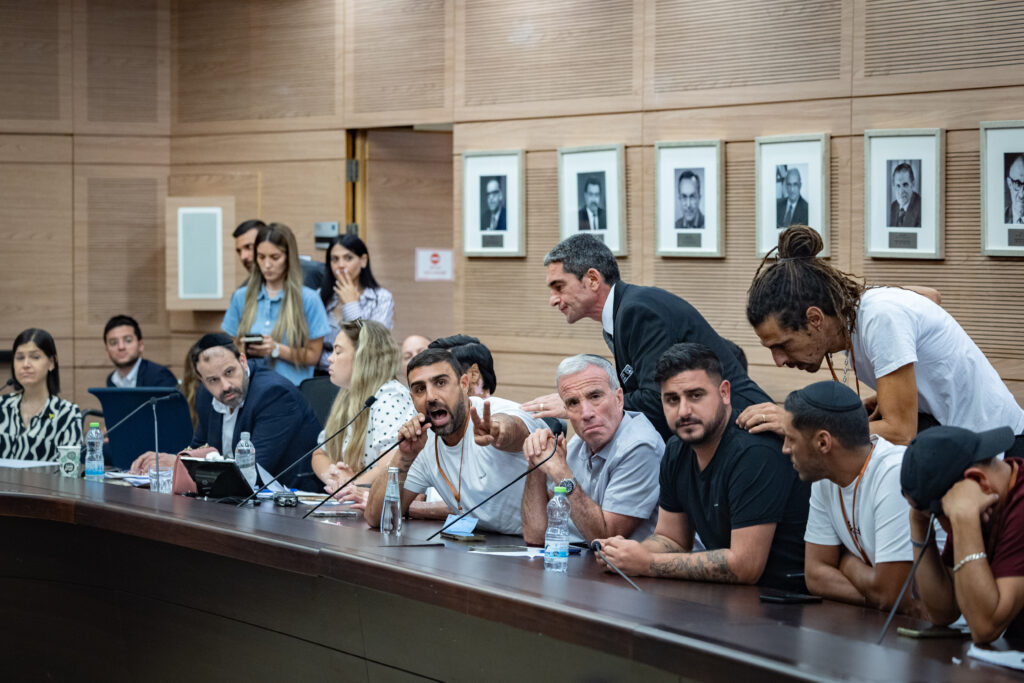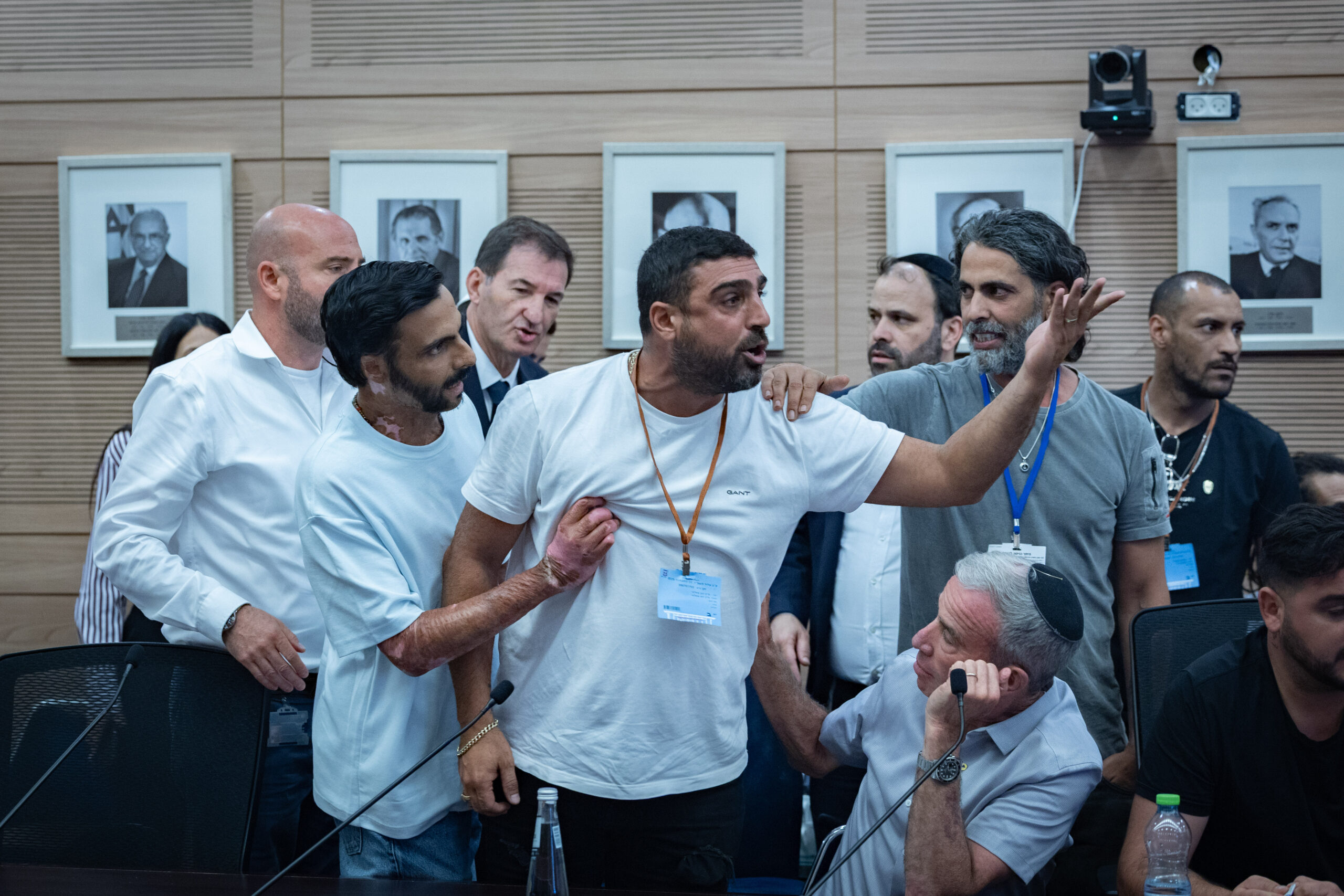A Knesset hearing on preventing suicide among soldiers and veterans descended into chaos Monday morning, as combat veterans dumped bags of medications onto the committee table in a desperate plea for action.
“We’ve been crying out for years — the holidays will be a trigger for more cases,” one veteran shouted, before hurling boxes of pills across the room. Another accused lawmakers of neglect: “Five years ago, I warned you about these suicides. You did nothing. You did nothing.”
The dramatic protest at the Labor and Welfare Committee highlighted the growing mental health crisis within the Israel Defense Forces and among discharged soldiers since Hamas’s October 7, 2023, massacre unleashed nearly two years of war.
Committee chairwoman Michal Woldiger (Religious Zionism) struggled to contain the outburst. “You can keep throwing pills if you want, but we want to help you,” she told the veterans. “I can’t run a discussion like this.” Yet she admitted that the surge in suicides reflects systemic failures: “The recent war has exacerbated the need. We are seeing a sharp increase in distress and suicides, both in civilian society and in the IDF.”
הלומי הקרב זרקו תרופות בועדת העבודה והרווחה העוסקת במניעת אובדנות – "הכל זה אובדנות, מה אנחנו מחבלים!?" pic.twitter.com/MSsnXmSpyM
— ערוץ כנסת (@KnessetT) September 15, 2025
While suicide rates among compulsory service members have remained steady, the toll on reservists — called up in unprecedented numbers since October 7 — has risen dramatically. IDF data show 28 suspected suicides among soldiers between the Hamas attack and the end of 2023, compared to just 14 in all of 2022. By August 2025, 37 more suicides had been recorded, 16 of them this year.
Most of these cases were linked to psychological trauma: prolonged deployments, witnessing the deaths of comrades, and the strain of returning to civilian life. One soldier, Daniel Edri, who died earlier this year, became a symbol of the crisis after months of battling war-related trauma.
“This is the darkest battle we are facing,” said Brig. Gen. Amir Vadmani, chief of staff of the IDF’s Personnel Directorate. “The war did not end at the battlefield. It continues inside our soldiers’ minds.”
At a later Knesset session of the Foreign Affairs and Defense Committee, veteran Itzik Saidyan — who self-immolated outside a Defense Ministry office in 2021 to protest inadequate PTSD care — lashed out at lawmakers.
“There have been discussions for more than 15 years now about care for combat trauma victims,” Saidyan told the committee. “Another discussion, and another. When will you understand that you must cancel all your other debates and focus solely on this? Put an end to this!”
Committee Chairman Boaz Bismuth (Likud) responded by inviting Saidyan to advise lawmakers on the issue, while other veterans demanded immediate measures, including a 24/7 emergency response system, wider access to social workers, and family training programs.
Figures from the Defense Ministry’s Rehabilitation Division underscore the magnitude of the challenge. Since October 2023, the division has treated more than 20,000 wounded soldiers, 56% of whom suffer from psychological conditions such as anxiety, depression, and post-traumatic stress disorder (PTSD).
“Half of the wounded are under 30 years old, and many are reservists,” said division head Limor Luria. “We expect tens of thousands more. There is no magic cure for psychological injury, and the functional impairments are much more significant.”

By 2028, officials project the number of wounded under the division’s care will reach 100,000, with at least 50,000 battling mental health conditions. Already, 31,000 Israeli security personnel nationwide are being treated for PTSD and related issues.
Severe shortages compound the burden: a ratio of one rehabilitation worker for every 750 patients, gaps in treatment availability in peripheral areas, and a shortage of trauma specialists.
The IDF and Defense Ministry have moved to expand care. Combat stress teams are now embedded in front-line units, and commanders are being trained to spot early warning signs. Emergency hotlines operate 24/7, and nature-based therapies, neurofeedback, and even surfing programs have been rolled out as alternatives to traditional clinical settings.
Defense Minister Israel Katz and Finance Minister Bezalel Smotrich announced a public committee chaired by Professor Shlomo Mor-Yosef to streamline recognition of PTSD cases and improve rehabilitation. Meanwhile, Maj.-Gen. (res.) Moti Almoz has been tasked with overhauling the military’s mental health support system.
Still, veterans say the gap between promises and practice remains vast. “Promises need to be fulfilled,” warned Omer Amsalem, a PTSD sufferer from Operation Protective Edge. “We do not want to be the next suicide case. You sent a 19-year-old to fight but did not care for him afterward.”
Nearly two years after October 7, the IDF counts more than 900 soldiers killed, 20,000 wounded, and over 1,100 discharged due to PTSD. Experts warn that the true scale of trauma will only emerge in the coming years.
“This is a national challenge that involves all of us,” said Luria. “The families, the health system, the community — everyone must play a role. The war may one day end, but for many, the battle with PTSD is only beginning.”




